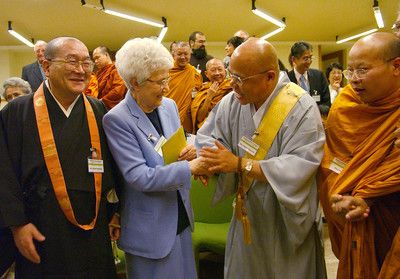
Mar 19, 2017 | Non categorizzato
 The founder of the Focolare Movement died at Rocca di Papa on the 14th March 2008 at the age of 88 after a long illness. In the telegram of condolence sent by Pope Benedict XVI, he mentioned “her constant commitment for communion in the Church for ecumenical dialogue and brotherhood among all peoples”. He also thanked the Lord “for the witness of a life spent hearing the needs of people today” and expressed the wish “that all those who knew her and follow in her footsteps should keep the flame of the charism alive”. Chiara Lubich’s charism focuses on unity in the human family. It would be a dream if it were not founded on firm faith in the love of God the Father for his children, and on the words of Jesus, “May they all be one”. This charism has much to say to the world today as Maria Voce said to Adriana Masotti. A. – Yes, indeed. It almost has more to say today than when Chiara first proclaimed it. At the time, there was of course the tragedy of war and many painful situations, but there was not the disunity that seems to be spreading so much in the world today. This disunity cries out for the lifestyle brought by the charism of unity God gave to Chiara. We are discovering its relevance more and more. Q. – One of the definitions made of Chiara Lubich was a “woman of dialogue” and dialogue is a subject talked much about in many places today. However, often it does not happen or people do not know how to do it. What did dialogue mean to Chiara and how does the Focolare Movement practice this dialogue? A. – Dialogue was a lifestyle for Chiara, which meant considering every person she met as a brother or sister. Chiara did not want to dialogue; she wanted to love people who were her brothers and sisters; and that is why she was so happy to meet people. She shared what was in her soul and then these brothers and sisters spontaneously responded with the same openness. That is how dialogue began. It is the same for us today; we try to have this attitude towards whomever we meet. We try to do as Chiara did, to be always open, without looking at differences and distinctiveness of any kind except as a way to create an enriching encounter, because it is a meeting with a brother or sister who has something to give us, whatever their ethnicity or religious faith, whatever their social background or age. Q. – So the Movement is convinced that dialogue is the best tool to resolve the many conflicts in the world today. A. – Of course! There is no other way. Why? Because dialogue is love, and if dialogue is love it can truly change the state of the world. It can bring peace to places at war. D. – At the beginning of her spiritual experience, Chiara was strongly aware of humanity’s cry of suffering and she decided to take on and bear this suffering herself. What does the Movement Chiara founded do with regard to the many divisions the world is experiencing at present? R. – The Movement wants to have the same faith as Chiara, a faith based on the cry of Jesus forsaken. Chiara certainly understood that cry as the moment when the Son of God suffered the most, but it was also when He loved us the most. Precisely because he loved us the most, in that moment he re-established the unity that was broken between God and humankind and among people. Therefore, there is no other way of reaching unity than by passing through suffering. However, this suffering is filled with love because it is part of giving one’s life for others. So, considering all the sufferings of the world today, whether at a personal level or at the level of society, peoples or nations, the Movement tries to recognize His countenance in these, to see in them a God who died. But He is also a God who rose again and who can therefore rise above all these sufferings. D. – This translates into many practical activities … R. – Precisely. Perhaps they start with a simple act of love by a family who saw that another family was experiencing a similar difficult situation, and who took upon themselves the difficulties of another family with a disabled child. This created a network of solidarity among many families and involved the local town council. They realized that by loving the countenance of Jesus forsaken in that suffering, something changed. This is what we see. Wherever we are, in places where there is war, our people try to love enemies as well as friends. Goods are shared among all the families without looking to see which ethnic group or religion they belong to… We see this continually in many relationships that change and we see new communities building up that are connected among themselves and spreading more and more. Source: Vatican Radio
The founder of the Focolare Movement died at Rocca di Papa on the 14th March 2008 at the age of 88 after a long illness. In the telegram of condolence sent by Pope Benedict XVI, he mentioned “her constant commitment for communion in the Church for ecumenical dialogue and brotherhood among all peoples”. He also thanked the Lord “for the witness of a life spent hearing the needs of people today” and expressed the wish “that all those who knew her and follow in her footsteps should keep the flame of the charism alive”. Chiara Lubich’s charism focuses on unity in the human family. It would be a dream if it were not founded on firm faith in the love of God the Father for his children, and on the words of Jesus, “May they all be one”. This charism has much to say to the world today as Maria Voce said to Adriana Masotti. A. – Yes, indeed. It almost has more to say today than when Chiara first proclaimed it. At the time, there was of course the tragedy of war and many painful situations, but there was not the disunity that seems to be spreading so much in the world today. This disunity cries out for the lifestyle brought by the charism of unity God gave to Chiara. We are discovering its relevance more and more. Q. – One of the definitions made of Chiara Lubich was a “woman of dialogue” and dialogue is a subject talked much about in many places today. However, often it does not happen or people do not know how to do it. What did dialogue mean to Chiara and how does the Focolare Movement practice this dialogue? A. – Dialogue was a lifestyle for Chiara, which meant considering every person she met as a brother or sister. Chiara did not want to dialogue; she wanted to love people who were her brothers and sisters; and that is why she was so happy to meet people. She shared what was in her soul and then these brothers and sisters spontaneously responded with the same openness. That is how dialogue began. It is the same for us today; we try to have this attitude towards whomever we meet. We try to do as Chiara did, to be always open, without looking at differences and distinctiveness of any kind except as a way to create an enriching encounter, because it is a meeting with a brother or sister who has something to give us, whatever their ethnicity or religious faith, whatever their social background or age. Q. – So the Movement is convinced that dialogue is the best tool to resolve the many conflicts in the world today. A. – Of course! There is no other way. Why? Because dialogue is love, and if dialogue is love it can truly change the state of the world. It can bring peace to places at war. D. – At the beginning of her spiritual experience, Chiara was strongly aware of humanity’s cry of suffering and she decided to take on and bear this suffering herself. What does the Movement Chiara founded do with regard to the many divisions the world is experiencing at present? R. – The Movement wants to have the same faith as Chiara, a faith based on the cry of Jesus forsaken. Chiara certainly understood that cry as the moment when the Son of God suffered the most, but it was also when He loved us the most. Precisely because he loved us the most, in that moment he re-established the unity that was broken between God and humankind and among people. Therefore, there is no other way of reaching unity than by passing through suffering. However, this suffering is filled with love because it is part of giving one’s life for others. So, considering all the sufferings of the world today, whether at a personal level or at the level of society, peoples or nations, the Movement tries to recognize His countenance in these, to see in them a God who died. But He is also a God who rose again and who can therefore rise above all these sufferings. D. – This translates into many practical activities … R. – Precisely. Perhaps they start with a simple act of love by a family who saw that another family was experiencing a similar difficult situation, and who took upon themselves the difficulties of another family with a disabled child. This created a network of solidarity among many families and involved the local town council. They realized that by loving the countenance of Jesus forsaken in that suffering, something changed. This is what we see. Wherever we are, in places where there is war, our people try to love enemies as well as friends. Goods are shared among all the families without looking to see which ethnic group or religion they belong to… We see this continually in many relationships that change and we see new communities building up that are connected among themselves and spreading more and more. Source: Vatican Radio
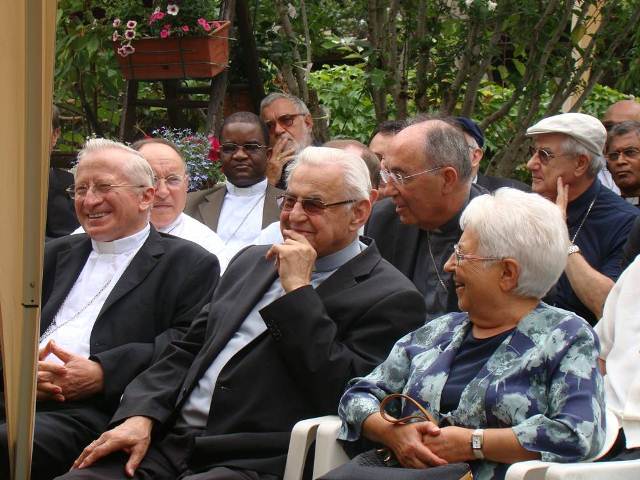
Mar 18, 2017 | Focolare Worldwide
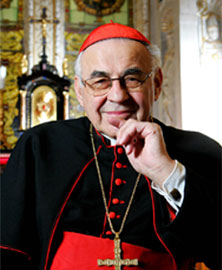 As a child, he dreamt of being a pilot, but an attraction to the priesthood stuck with him from the time he was eleven. He was born on May 17, 1932 in Lisnice, the Province of Pisek in Southern Bohemia. From 1952 to 1953 he was a worker. In 1960, following his graduation, he worked as an archivist but soon abandoned that occupation to study theology. In 1968 he was ordained to the priesthood. During a visit to East Germany in the 1960s, he met a layman and some priests who were living the spirituality of the Focolare Movement. He was taken by the presence of Jesus among this group of Christians, a presence that He promises when two or more are united in His name (see Mt 18:20). That experience of communion would accompany him for the rest of his life. His pastoral work in Ceské Budejovice annoyed the Communist State system, and in 1971 he was transferred to a parish in Selva Boema. Seven years later, because of his popularity especially among young people, his permission to carry out his priestly ministry was revoked. “I lost my license. I can’t say mass anymore,” he explained to his parishioners. “I preached and talked about the cross and recommended that we carry it; now is the moment for me to carry it.” Officially returned to the lay state, Chiara Lubich accepted his request to enter the focolare in Prague that was opened in 1981. He found a job as a window-washer that lasted for 10 years. He would often say: “I can’t preach or share the sacraments in public, but when I look at the cross I realize that Jesus who is the one and only High Priest could hardly even talk when he was on the cross, and his hands were nailed in. I became convinced: ‘Now, you’re close to the High Priest’ and I embraced Jesus Forsaken. It was the spirituality of the Focolare that guided me in this direction. I felt the power of which Isaiah 53 speaks: ‘The man of suffering’ (…) I lived for a long time of this light: everything that was ugly could serve for my edification. I realized, without exaggerating, that those ten years of washing windows had been the most blessed years of my life.” He would often repeat: “I hold it to be a miracle that God spread the spirituality of unity in the Socialist world where everything was under surveillance. He always knows the ways in.”
As a child, he dreamt of being a pilot, but an attraction to the priesthood stuck with him from the time he was eleven. He was born on May 17, 1932 in Lisnice, the Province of Pisek in Southern Bohemia. From 1952 to 1953 he was a worker. In 1960, following his graduation, he worked as an archivist but soon abandoned that occupation to study theology. In 1968 he was ordained to the priesthood. During a visit to East Germany in the 1960s, he met a layman and some priests who were living the spirituality of the Focolare Movement. He was taken by the presence of Jesus among this group of Christians, a presence that He promises when two or more are united in His name (see Mt 18:20). That experience of communion would accompany him for the rest of his life. His pastoral work in Ceské Budejovice annoyed the Communist State system, and in 1971 he was transferred to a parish in Selva Boema. Seven years later, because of his popularity especially among young people, his permission to carry out his priestly ministry was revoked. “I lost my license. I can’t say mass anymore,” he explained to his parishioners. “I preached and talked about the cross and recommended that we carry it; now is the moment for me to carry it.” Officially returned to the lay state, Chiara Lubich accepted his request to enter the focolare in Prague that was opened in 1981. He found a job as a window-washer that lasted for 10 years. He would often say: “I can’t preach or share the sacraments in public, but when I look at the cross I realize that Jesus who is the one and only High Priest could hardly even talk when he was on the cross, and his hands were nailed in. I became convinced: ‘Now, you’re close to the High Priest’ and I embraced Jesus Forsaken. It was the spirituality of the Focolare that guided me in this direction. I felt the power of which Isaiah 53 speaks: ‘The man of suffering’ (…) I lived for a long time of this light: everything that was ugly could serve for my edification. I realized, without exaggerating, that those ten years of washing windows had been the most blessed years of my life.” He would often repeat: “I hold it to be a miracle that God spread the spirituality of unity in the Socialist world where everything was under surveillance. He always knows the ways in.” 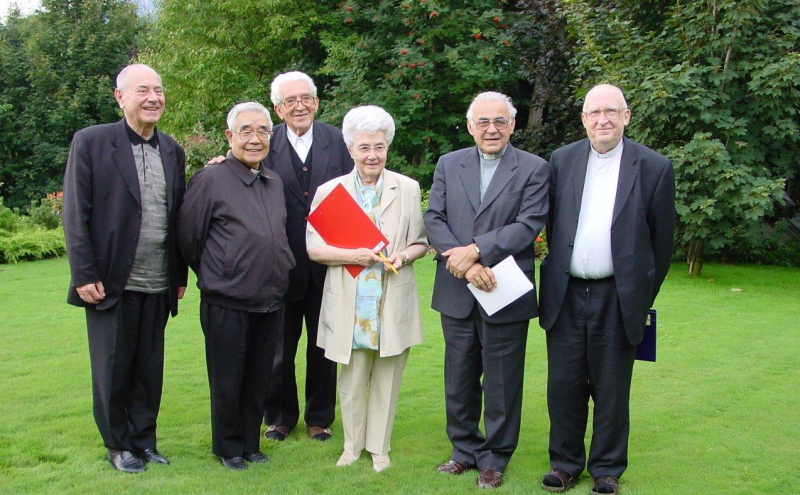 With the Velvet Revolution in 1989 he became pastor again. In 1990 he was named bishop of Ceské Budejovice and, in the following years, Archbishop of Prague. From 1992 to 2000 he guided the Czech Bishops Conference and from 1993-2001 becamse President of the Council of the Bishops Conferences of Europe. On November 26, 1994, he was created cardinal. Following the death of Bishop Klaus Hemmerle in January 1994, who began the branch of the Bishop Friends of the Focolare Movement, the foundress invited Archbishop of Prague to assume the role as moderator of that branch of the Movement. He succeded Bishop Hemmerle who had been a great theologian and charismatic figure. It seemed too demanding to him, but Chiara Lubich assured him: “Don’t be afraid, Your Emminance, you won’t be alone. You’ll go ahead as a body.” The cardinal carried out this task for 18 years, convoking and supporting numerous international meetings of bishops from both the Catholic and other Churches, which were held in Castel Gandolfo, Italy, Istanbul, Jerusalem, Beirut, Augsburg, Wittenburg, London, Geneva, El Cairo, just to name a few.
With the Velvet Revolution in 1989 he became pastor again. In 1990 he was named bishop of Ceské Budejovice and, in the following years, Archbishop of Prague. From 1992 to 2000 he guided the Czech Bishops Conference and from 1993-2001 becamse President of the Council of the Bishops Conferences of Europe. On November 26, 1994, he was created cardinal. Following the death of Bishop Klaus Hemmerle in January 1994, who began the branch of the Bishop Friends of the Focolare Movement, the foundress invited Archbishop of Prague to assume the role as moderator of that branch of the Movement. He succeded Bishop Hemmerle who had been a great theologian and charismatic figure. It seemed too demanding to him, but Chiara Lubich assured him: “Don’t be afraid, Your Emminance, you won’t be alone. You’ll go ahead as a body.” The cardinal carried out this task for 18 years, convoking and supporting numerous international meetings of bishops from both the Catholic and other Churches, which were held in Castel Gandolfo, Italy, Istanbul, Jerusalem, Beirut, Augsburg, Wittenburg, London, Geneva, El Cairo, just to name a few.  The membership of the Bishops in the Work of Mary is entirely spiritual and does not interfere in any way with their duties as bishops, as established by the Church. They find that the spirituality of unity is “in profound harmony with the episcopal charism. It reinforces the effective and affective collegiality and unity with the Holy Father, among the bishops, and helps them to actualize the teachings of the Second Vatican Council on the Church-Communion.” This is written in their rule of life for the “Bishop Friends of the Movement” which was recognized by John Paul II and approved by the Pontifical Council of the Laity in a letter dated February 14, 1998. Also the heads of several other Christian Church’s have expressed their appreciation for this initiative. See also: News.va – Telegram of condolences for the death of Cardinal Miloslav Vlk
The membership of the Bishops in the Work of Mary is entirely spiritual and does not interfere in any way with their duties as bishops, as established by the Church. They find that the spirituality of unity is “in profound harmony with the episcopal charism. It reinforces the effective and affective collegiality and unity with the Holy Father, among the bishops, and helps them to actualize the teachings of the Second Vatican Council on the Church-Communion.” This is written in their rule of life for the “Bishop Friends of the Movement” which was recognized by John Paul II and approved by the Pontifical Council of the Laity in a letter dated February 14, 1998. Also the heads of several other Christian Church’s have expressed their appreciation for this initiative. See also: News.va – Telegram of condolences for the death of Cardinal Miloslav Vlk
Mar 18, 2017 | Non categorizzato
Today, 18 March, Cardinal Miloslav Vlk, Emeritus Archbishop of Prague, passed way. He was 86 years old. For 18 years, he was the moderator of the group of bishops who adhere to the spirituality of unity. The Focolare Movement expresses deep gratitude for his life.
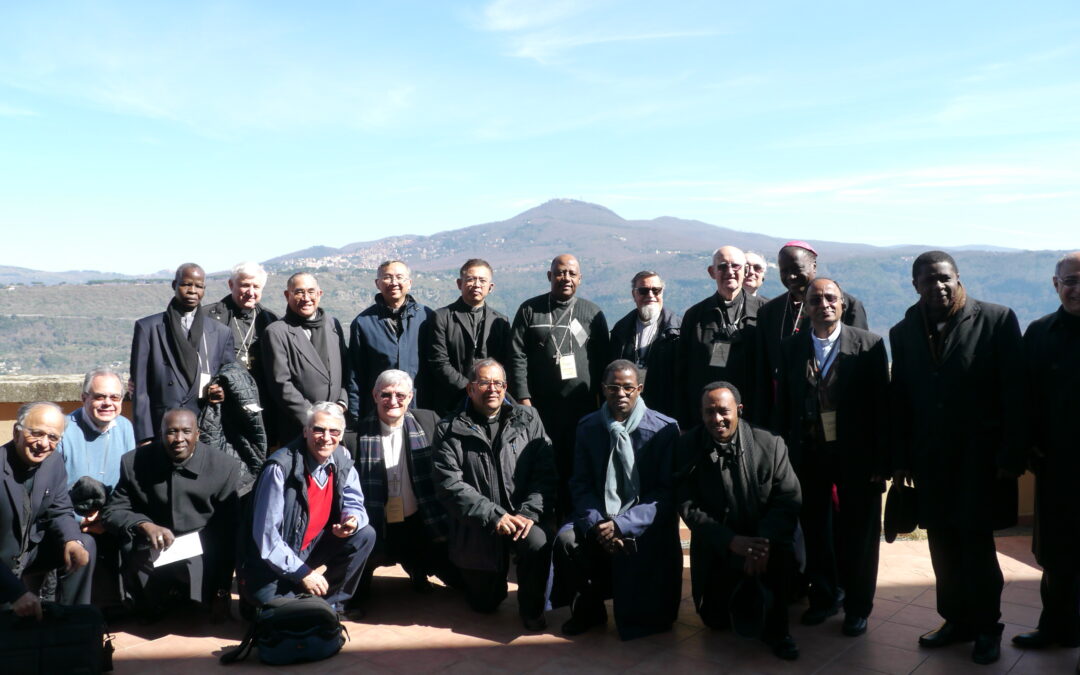
Mar 18, 2017 | Focolare Worldwide
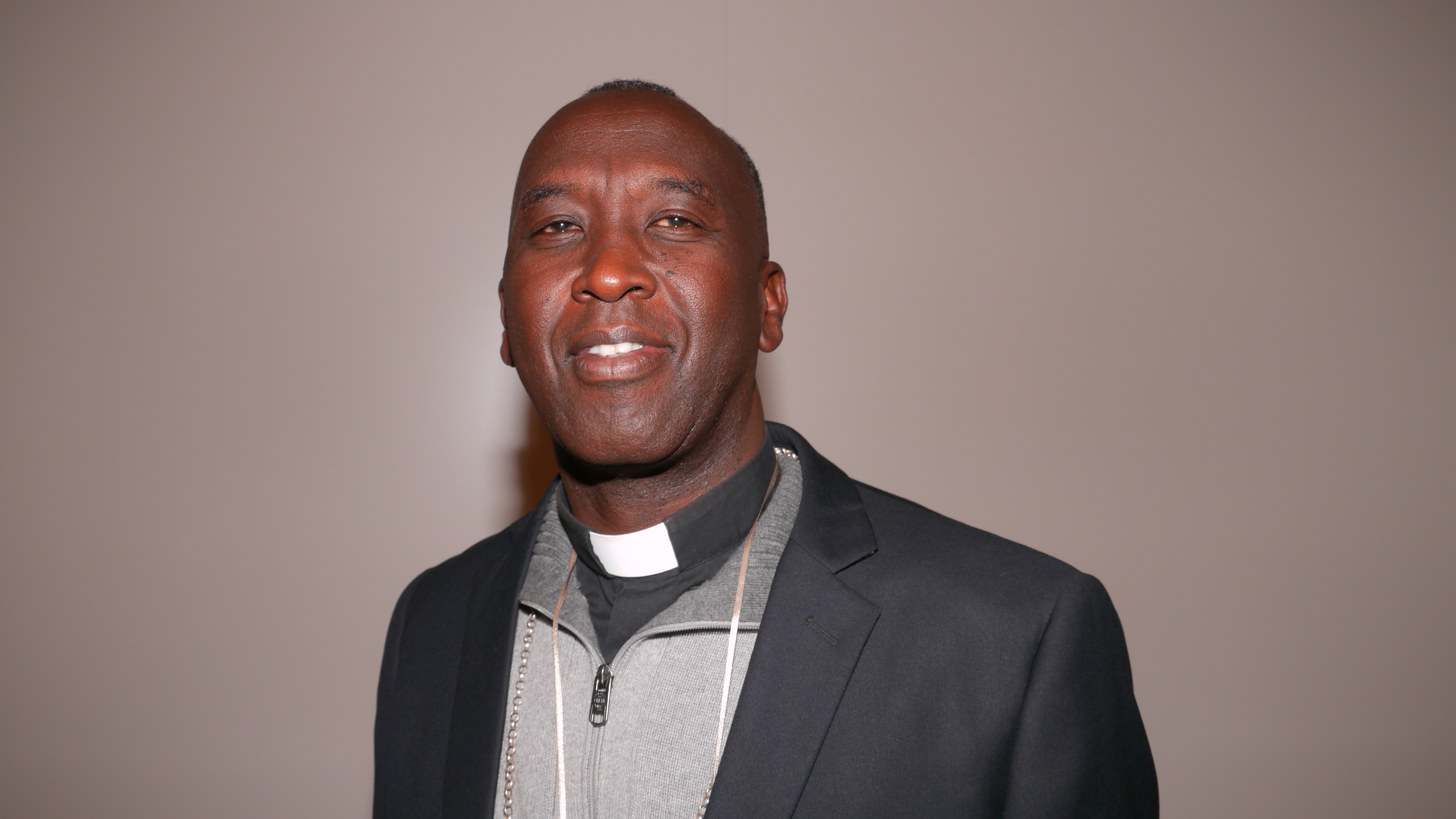 Our diocese of Lodwar – Bishop Dominic Kimengich recounts – is situated in Turkana County (Kenya), bordering with Uganda, South Sudan and Ethiopia. It is 700 km away from Nairobi. The travelers who come to us have to ensure that there is a police escort along the route, so as not to encounter bandits and robbers in the frequent raids. Due to climactic changes, it has not rained for a long time, with the terrible consequence of the shortage that has affected the entire Turkana area. Sixty percent of the population still live the nomad lifestyle and up to now have survived by raising camels, sheep, goats, donkeys and cattle. Now that there is no food or pastures for the cattle, they are forced to migrate to nearby countries. Given that this is a zone of confines, the many conflicts between bordering tribes battling for survival provoke the death of many innocent people, among which are women and children. In the diocese we have a huge refugee camp called Kakuma, with almost 200,000 refugees coming mostly from South Sudan, where the situation is worsening each day. But many also come from Somalia. We find ourselves in a very difficult situation since not even the inhabitants of Lodwar have enough food and water. Many children have even stopped going to school for lack of food. In 1985 when I was in the seminary, someone told me about the Focolare spirituality, but once a priest I was assigned to a parish where it was difficult to keep in contact with the Movement. It was only when I became a Bishop that I was able to attend some meetings in Nairobi. In 2012, to celebrate the 50th year of evangelisation, we thought of inviting the bishops of the surrounding dioceses: Uganda, South Sudan, Ethiopia and other four dioceses in Kenya, to speak about peace and reflect on what we can do. Ten Bishops attended and we got together for three days, a meeting which is now held every year. We can say that every time we would meet, the conflict was reduced. Once I went to visit Bishop Markos of Ethiopia, who is also present in this congress and from the unity built also with the other bishops, we find the strength to bring ahead our ministry in such a troubled land.
Our diocese of Lodwar – Bishop Dominic Kimengich recounts – is situated in Turkana County (Kenya), bordering with Uganda, South Sudan and Ethiopia. It is 700 km away from Nairobi. The travelers who come to us have to ensure that there is a police escort along the route, so as not to encounter bandits and robbers in the frequent raids. Due to climactic changes, it has not rained for a long time, with the terrible consequence of the shortage that has affected the entire Turkana area. Sixty percent of the population still live the nomad lifestyle and up to now have survived by raising camels, sheep, goats, donkeys and cattle. Now that there is no food or pastures for the cattle, they are forced to migrate to nearby countries. Given that this is a zone of confines, the many conflicts between bordering tribes battling for survival provoke the death of many innocent people, among which are women and children. In the diocese we have a huge refugee camp called Kakuma, with almost 200,000 refugees coming mostly from South Sudan, where the situation is worsening each day. But many also come from Somalia. We find ourselves in a very difficult situation since not even the inhabitants of Lodwar have enough food and water. Many children have even stopped going to school for lack of food. In 1985 when I was in the seminary, someone told me about the Focolare spirituality, but once a priest I was assigned to a parish where it was difficult to keep in contact with the Movement. It was only when I became a Bishop that I was able to attend some meetings in Nairobi. In 2012, to celebrate the 50th year of evangelisation, we thought of inviting the bishops of the surrounding dioceses: Uganda, South Sudan, Ethiopia and other four dioceses in Kenya, to speak about peace and reflect on what we can do. Ten Bishops attended and we got together for three days, a meeting which is now held every year. We can say that every time we would meet, the conflict was reduced. Once I went to visit Bishop Markos of Ethiopia, who is also present in this congress and from the unity built also with the other bishops, we find the strength to bring ahead our ministry in such a troubled land. 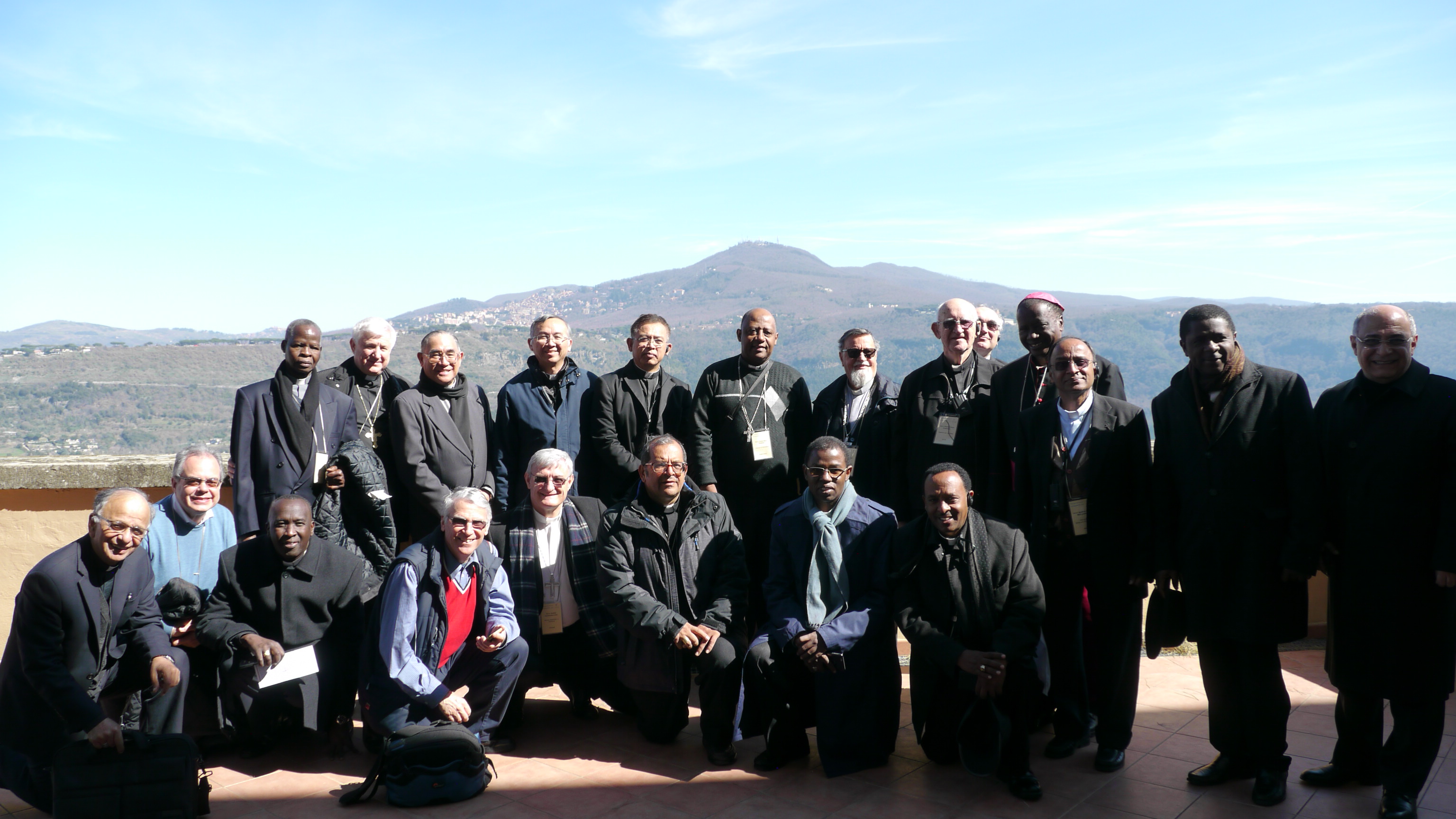 Here in Castel Gandolfo it’s so wonderful to be able to share our own experience with bishops of the whole world and together go deeper into the charism of unity, which teaches us in a practical way on how to live – also as bishops – a genuine love in the spirit of fraternity. Participating in this Congress was a big testimony of God’s love for me and of how He wants us to love one another as Jesus loved us. The theme chosen for this year is greatly in line with the reality of my life and of the territory I come from. It is only seeing things from the point of view of Jesus crucified and abandoned that we can hope in a world where people can learn to live in peace, sharing what they have up to the point of embracing one another as sons of the same God the Father. As I prepare to return to my diocese I can testify with certainty that I am not the same person as before. I feel strengthened by unity with my bishop brothers. In unity in Jesus Forsaken, I know that I am not alone in that part of Kenya in facing the many difficult situations. Jesus is with me, and is very close. I also know that I can count on the prayers of the whole Movement. I am very grateful to God who made all this possible.
Here in Castel Gandolfo it’s so wonderful to be able to share our own experience with bishops of the whole world and together go deeper into the charism of unity, which teaches us in a practical way on how to live – also as bishops – a genuine love in the spirit of fraternity. Participating in this Congress was a big testimony of God’s love for me and of how He wants us to love one another as Jesus loved us. The theme chosen for this year is greatly in line with the reality of my life and of the territory I come from. It is only seeing things from the point of view of Jesus crucified and abandoned that we can hope in a world where people can learn to live in peace, sharing what they have up to the point of embracing one another as sons of the same God the Father. As I prepare to return to my diocese I can testify with certainty that I am not the same person as before. I feel strengthened by unity with my bishop brothers. In unity in Jesus Forsaken, I know that I am not alone in that part of Kenya in facing the many difficult situations. Jesus is with me, and is very close. I also know that I can count on the prayers of the whole Movement. I am very grateful to God who made all this possible.
Mar 17, 2017 | Non categorizzato
On the early morning of March 16, 2017, the earthly journey of Gianni Caso came to an end. He was a focolarino, jurist and magistrate, columnist for Città Nuova magazine and, for many years, responsible for Communion and Law. A short biography will be published soon.
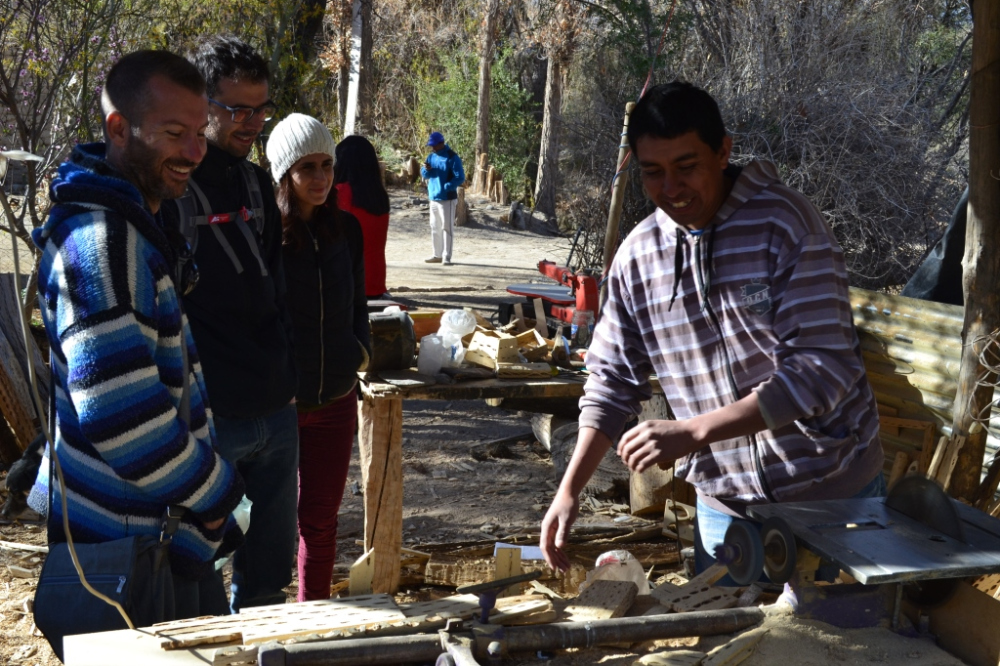
Mar 17, 2017 | Focolare Worldwide
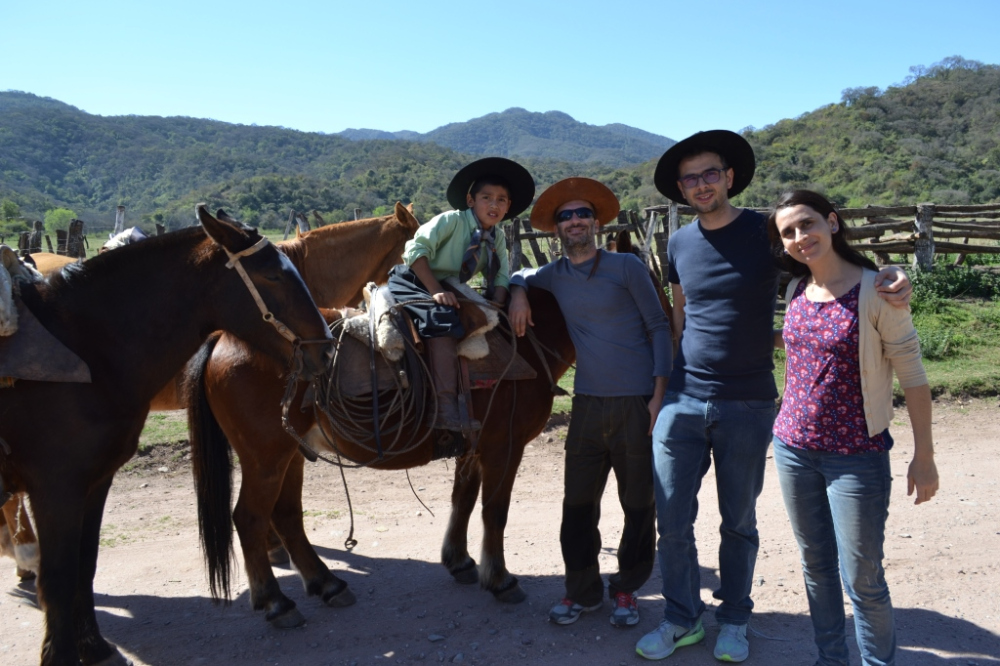 The solidarity tourism project that the Ministry of Tourism of Salta, Argentina has been promoting for six years supports small communities in the cities of Salta, Jujuy and Catamarca in the north of the country. It is enhancing the region’s natural resources in order to save the cultural richness and diversity that is linked to local history. At the same time, it offers professional training for the production of products related to the sectors of tourism, housing, transport and the sale of handicrafts and food products (jams, liqueurs, honey, and more). This has helped to avoid the migration of populations from rural areas to urban ones, preventing the increase of poverty areas in the big cities while protecting small communities that have a rich culture that is disappearing.
The solidarity tourism project that the Ministry of Tourism of Salta, Argentina has been promoting for six years supports small communities in the cities of Salta, Jujuy and Catamarca in the north of the country. It is enhancing the region’s natural resources in order to save the cultural richness and diversity that is linked to local history. At the same time, it offers professional training for the production of products related to the sectors of tourism, housing, transport and the sale of handicrafts and food products (jams, liqueurs, honey, and more). This has helped to avoid the migration of populations from rural areas to urban ones, preventing the increase of poverty areas in the big cities while protecting small communities that have a rich culture that is disappearing. 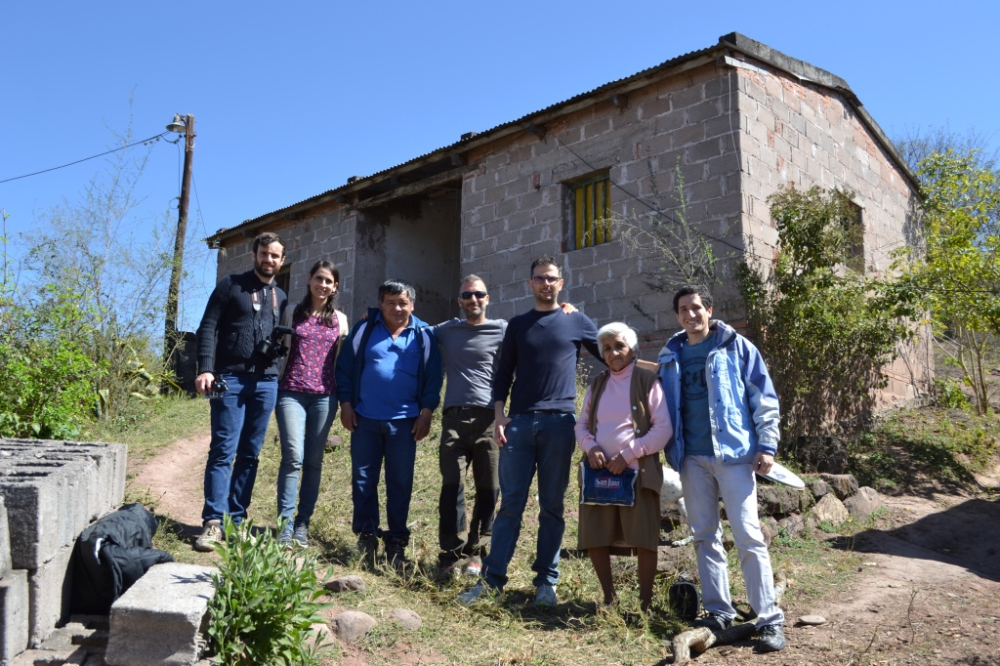 “What distinguishes this experience of development from other types of experiences,” sociologist Virginia Osorio from the Sumá Fraternidad explains, “are the words “communion” and “dialogue”. Communion, because each actor has put his or her own talents and resources in common for the development of the project; dialogue, because throughout the development process, there was strong interaction between the different components who were often in conflict with one another. Difficulties were never lacking, but the strategy used to overcome those difficulties was to work in squads and practice active listening among parties: the local community, the State, businesses and other types of civil organisations.” She went on to say: “The result of this experience has been the birth of a new product and of a new kind of consumer. It’s not the idea of tourism that we have been used to. In this experience there is the added value of contact with the rich cultural wealth of small rural communities and, in several cases, of the descendents of indigenousness peoples. This type of tourism creates encounter among people among people.”
“What distinguishes this experience of development from other types of experiences,” sociologist Virginia Osorio from the Sumá Fraternidad explains, “are the words “communion” and “dialogue”. Communion, because each actor has put his or her own talents and resources in common for the development of the project; dialogue, because throughout the development process, there was strong interaction between the different components who were often in conflict with one another. Difficulties were never lacking, but the strategy used to overcome those difficulties was to work in squads and practice active listening among parties: the local community, the State, businesses and other types of civil organisations.” She went on to say: “The result of this experience has been the birth of a new product and of a new kind of consumer. It’s not the idea of tourism that we have been used to. In this experience there is the added value of contact with the rich cultural wealth of small rural communities and, in several cases, of the descendents of indigenousness peoples. This type of tourism creates encounter among people among people.”  Stefano, a young Italian tourist who participated in the programme, reports: “I feel like for some people travelling is like looking at the world from a glass box. We travel in search of our Western standard, with our comforts, our certainties and securities. We go to “consume,” as if visiting places was like stopping to have a drink and then throwing the cup away. Many photos are taken, many souvenirs are bought, you eat at some local eatery and the game is over! A nation is not made of monuments and souvenirs, but of people that can offer hospitality, sharing their homes, their dinner tables, their music: this is the real way to travel! ‘Share’, Argentina!” The family of María José e Pablo from Argentina recount: “We liked this idea of vacation, taking walks, getting to know sites, but most of all the opportunity to meet these ‘human sites’ that at times are hidden in the background of the postcards … which allowed us to enter into the local reality of those communities. We had the strong feeling throughout this experience of breaking free from our scheme of things and filling our life with those people whom we now hold in our heart; experiencing the profound and tranquil rhythm of those places, and the scenery of many places we passed through on our trip. Now, as we return to the city, we look at daily life differently, with new eyes.”
Stefano, a young Italian tourist who participated in the programme, reports: “I feel like for some people travelling is like looking at the world from a glass box. We travel in search of our Western standard, with our comforts, our certainties and securities. We go to “consume,” as if visiting places was like stopping to have a drink and then throwing the cup away. Many photos are taken, many souvenirs are bought, you eat at some local eatery and the game is over! A nation is not made of monuments and souvenirs, but of people that can offer hospitality, sharing their homes, their dinner tables, their music: this is the real way to travel! ‘Share’, Argentina!” The family of María José e Pablo from Argentina recount: “We liked this idea of vacation, taking walks, getting to know sites, but most of all the opportunity to meet these ‘human sites’ that at times are hidden in the background of the postcards … which allowed us to enter into the local reality of those communities. We had the strong feeling throughout this experience of breaking free from our scheme of things and filling our life with those people whom we now hold in our heart; experiencing the profound and tranquil rhythm of those places, and the scenery of many places we passed through on our trip. Now, as we return to the city, we look at daily life differently, with new eyes.”
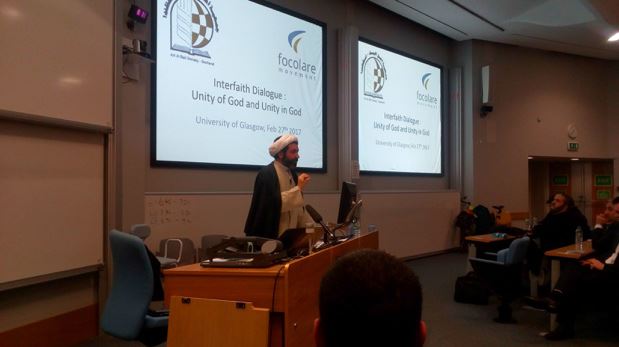
Mar 16, 2017 | Focolare Worldwide
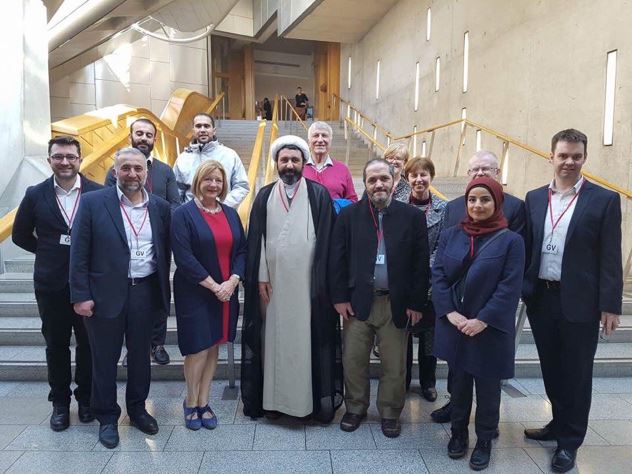 The University of Glasgow, founded in 1451, is one of Scotland’s four ancient universities. In this prestigious place, which educated seven future Nobel winners and heard Albert Einstein demonstrate his theory of relativity, the Focolare Movement and the Islamic society Ahl Al Bait organized an open lesson on interfaith dialogue and unity on 27 February. The evening was entitled “Unity in God and unity of God”. It featured a renowned figure of the Shiite world, Dr. Mohammad Ali Shomali, director of the International Institute of Islamic Studies at Qum, Iran, who currently is at the helm of the Islamic Centre of Great Britain. There was also Professor Paulo Frizzi, teacher of theology and the practice of interreligious dialogue at the Sophia University Institute at Loppiano, near Florence, Italy, where he coordinates the Sophia Global Studies research and training center. The following day, Dr Shomali was to lead a discussion before members of the Scottish Parliament.
The University of Glasgow, founded in 1451, is one of Scotland’s four ancient universities. In this prestigious place, which educated seven future Nobel winners and heard Albert Einstein demonstrate his theory of relativity, the Focolare Movement and the Islamic society Ahl Al Bait organized an open lesson on interfaith dialogue and unity on 27 February. The evening was entitled “Unity in God and unity of God”. It featured a renowned figure of the Shiite world, Dr. Mohammad Ali Shomali, director of the International Institute of Islamic Studies at Qum, Iran, who currently is at the helm of the Islamic Centre of Great Britain. There was also Professor Paulo Frizzi, teacher of theology and the practice of interreligious dialogue at the Sophia University Institute at Loppiano, near Florence, Italy, where he coordinates the Sophia Global Studies research and training center. The following day, Dr Shomali was to lead a discussion before members of the Scottish Parliament. 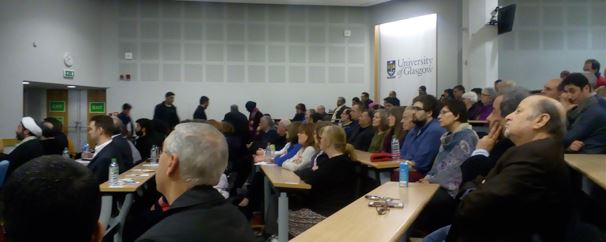 The longstanding friendship between Sophia University Institute and the Shiite academic brought about a dialogue and research project last summer that involved a group of Christian and Muslim scholars, with the suggestive title “Wings of Unity.” “I presented the methodology and atmosphere that our institute promotes, where we work with an academic approach that is integrated, where experience and application is placed alongside the theory,” explains Frizzi. “For example, a course on interreligious dialogue is taught by three of us with different academic backgrounds and experience, yet we try to develop a common program through reciprocal listening, sort of a journey of unity in which we co-teach the lessons and the students play a lead role.”
The longstanding friendship between Sophia University Institute and the Shiite academic brought about a dialogue and research project last summer that involved a group of Christian and Muslim scholars, with the suggestive title “Wings of Unity.” “I presented the methodology and atmosphere that our institute promotes, where we work with an academic approach that is integrated, where experience and application is placed alongside the theory,” explains Frizzi. “For example, a course on interreligious dialogue is taught by three of us with different academic backgrounds and experience, yet we try to develop a common program through reciprocal listening, sort of a journey of unity in which we co-teach the lessons and the students play a lead role.” 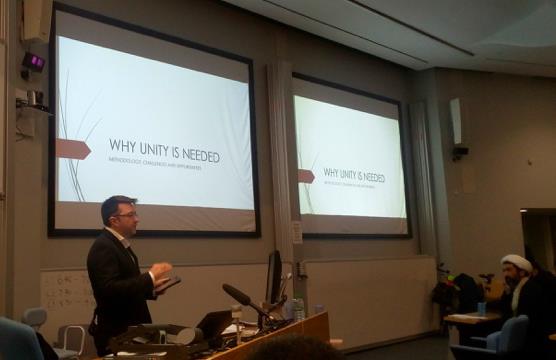 Wings of Unity, explains the Sophia professor, provides a physical space to dialogue, where on one hand students can deepen their understanding of what “unity in God and of God” means, clarifying elements of difference and those held in common. On the other, they can explore the ways in which unity can be tangibly lived, healing wounds and resolving differences. “Too often interfaith initiatives only touch on the questions of the few, without a tangible impact. This is a delicate moment we live in, and we have to take into account the transition towards an uncertain new world order, where greater interconnectivity and interdependence sit alongside painful divisions that fracture the unity of society. Globalization has probably failed in its attempt to build sustainable community, as multinational institutions fail to guarantee a safe space where cultures and religions can meet without the risk of losing themselves. “This may be true, but on the other hand there is experience, commitment and dialogue welling up that, in contrast, enriches neighborhoods and unifies communities. It begins deep down and helps us all think once again of unity amid diversity.” As Pope Francis states in Evangelii Gaudium, dialogue happens in a world that is not a pyramid (where some are at the top over many others) nor a sphere (without any distinguishable sides), but instead multifaceted, where all parts converge together while maintaining its own individuality.
Wings of Unity, explains the Sophia professor, provides a physical space to dialogue, where on one hand students can deepen their understanding of what “unity in God and of God” means, clarifying elements of difference and those held in common. On the other, they can explore the ways in which unity can be tangibly lived, healing wounds and resolving differences. “Too often interfaith initiatives only touch on the questions of the few, without a tangible impact. This is a delicate moment we live in, and we have to take into account the transition towards an uncertain new world order, where greater interconnectivity and interdependence sit alongside painful divisions that fracture the unity of society. Globalization has probably failed in its attempt to build sustainable community, as multinational institutions fail to guarantee a safe space where cultures and religions can meet without the risk of losing themselves. “This may be true, but on the other hand there is experience, commitment and dialogue welling up that, in contrast, enriches neighborhoods and unifies communities. It begins deep down and helps us all think once again of unity amid diversity.” As Pope Francis states in Evangelii Gaudium, dialogue happens in a world that is not a pyramid (where some are at the top over many others) nor a sphere (without any distinguishable sides), but instead multifaceted, where all parts converge together while maintaining its own individuality.  Dr Shomali intervenes with some words about identity: “If we reflect on how religions developed, we realize that one question has always been present: How can we keep people together, convincing them that, if we stay in the circle, we are better off?” The concept of identity caused us to distance ourselves from each other, in as much as we expressed not “who we are,” but rather “who we are not” – a model of identity based on fear and exclusion. If it ever worked in the past, it was because the world was quite segmented, without great opportunities to meet as people of different faiths, ethnic groups or cultures. This is no longer the case in a world in which identity is more fragile and nuanced. Because of this, holds the Shiite scholar: “We need a new understanding based on what we can offer and what we can appreciate in others. To relate is essential. I cannot be a good Muslim or Christian – or a good Iranian or Scot – if I don’t know how to relate with others and include them in my identity.” The very concept of identity, therefore, needs a rethink. “The human body has different organs, each with its own function. None of these, moreover, survives on its own.” He concluded: “When I read the Quran, I see that this is God’s plan. In his creation and revelation, God showed us the way toward unity.”
Dr Shomali intervenes with some words about identity: “If we reflect on how religions developed, we realize that one question has always been present: How can we keep people together, convincing them that, if we stay in the circle, we are better off?” The concept of identity caused us to distance ourselves from each other, in as much as we expressed not “who we are,” but rather “who we are not” – a model of identity based on fear and exclusion. If it ever worked in the past, it was because the world was quite segmented, without great opportunities to meet as people of different faiths, ethnic groups or cultures. This is no longer the case in a world in which identity is more fragile and nuanced. Because of this, holds the Shiite scholar: “We need a new understanding based on what we can offer and what we can appreciate in others. To relate is essential. I cannot be a good Muslim or Christian – or a good Iranian or Scot – if I don’t know how to relate with others and include them in my identity.” The very concept of identity, therefore, needs a rethink. “The human body has different organs, each with its own function. None of these, moreover, survives on its own.” He concluded: “When I read the Quran, I see that this is God’s plan. In his creation and revelation, God showed us the way toward unity.”
https://vimeo.com/207664744 https://vimeo.com/207664387
Mar 15, 2017 | Non categorizzato
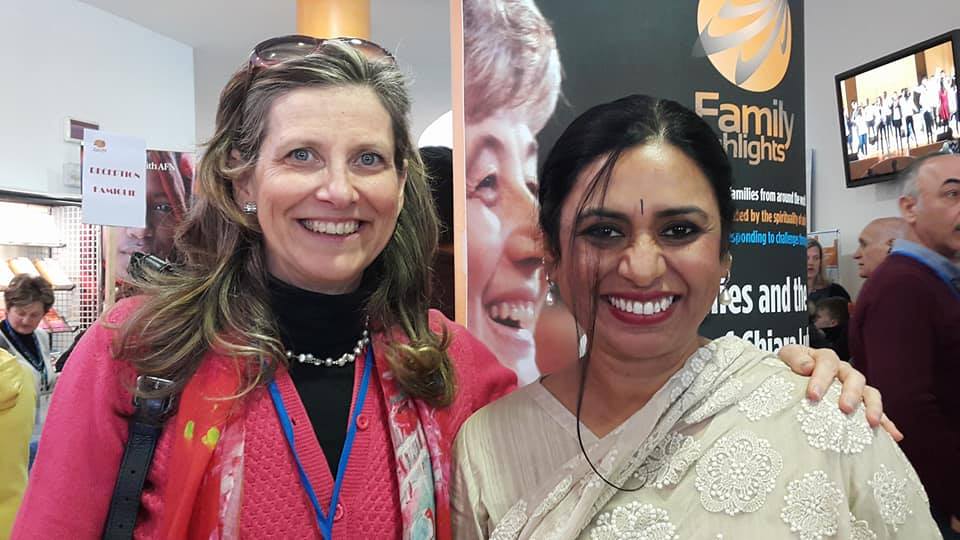
Mar 15, 2017 | Non categorizzato
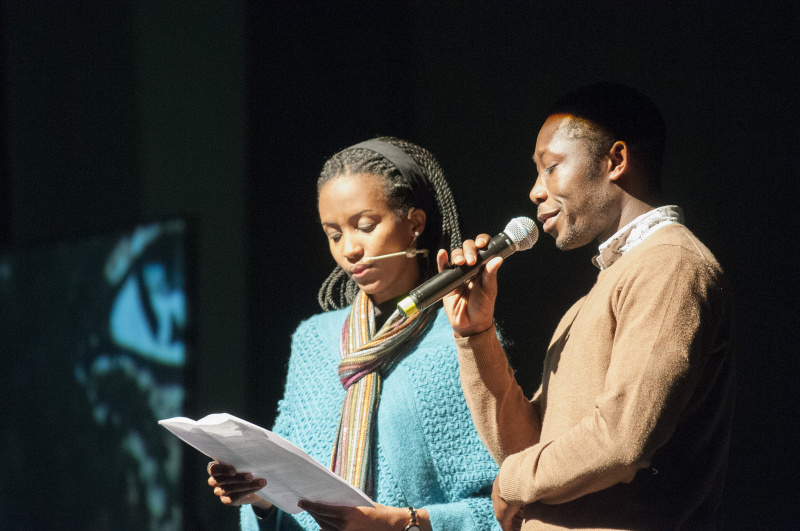 “Married life is like a boat,” said a family from Peru, “If you’re paddling by yourself, it’s tiring and you don’t get anywhere. Together you need to learn the art of reciprocity.” “We came because we feel the need to grow our family life and help others,” added a couple from Cameroon as they arrived at the FamilyHighlights meeting, which was held March 10-12 in Loppiano, Italy. The event, which marked the 50th anniversary of New Families, welcomed close to 1,000 families of different cultures and religions from 50 countries. It was connected to other gatherings worldwide held in memory of the ninth anniversary of Chiara Lubich’s passing. “Loving others as yourself, loving everyone, being the first to love, becoming one with others” –simple rules that the families of the international Loreto School emphasized as they welcomed everyone. This “art of loving” gives families the strength to renew themselves through trust, forgiveness, accountability, creativity, hospitality. These are seeds of communion that can even shed light on painful, challenging and traumatic situations. They show that “anger and distress do not have the last word,” said Gianni, who coordinates a group of 50 people who are separated. People’s stories and activities surfaced during the lively exchanges during the six workshops. One was for 150 children; other workshops were dedicated to couple dynamics in the various stages of life, educating children, and hospitality and solidarity with the disadvantaged in difficult situations. There were a few families from Syria, who found positive energy to face the fear and many difficulties caused by war. “That flower, which we attached at the end of the event, we’re also bringing it symbolically to other families and to everyone around us as a sign of fraternity and hope,” they said.
“Married life is like a boat,” said a family from Peru, “If you’re paddling by yourself, it’s tiring and you don’t get anywhere. Together you need to learn the art of reciprocity.” “We came because we feel the need to grow our family life and help others,” added a couple from Cameroon as they arrived at the FamilyHighlights meeting, which was held March 10-12 in Loppiano, Italy. The event, which marked the 50th anniversary of New Families, welcomed close to 1,000 families of different cultures and religions from 50 countries. It was connected to other gatherings worldwide held in memory of the ninth anniversary of Chiara Lubich’s passing. “Loving others as yourself, loving everyone, being the first to love, becoming one with others” –simple rules that the families of the international Loreto School emphasized as they welcomed everyone. This “art of loving” gives families the strength to renew themselves through trust, forgiveness, accountability, creativity, hospitality. These are seeds of communion that can even shed light on painful, challenging and traumatic situations. They show that “anger and distress do not have the last word,” said Gianni, who coordinates a group of 50 people who are separated. People’s stories and activities surfaced during the lively exchanges during the six workshops. One was for 150 children; other workshops were dedicated to couple dynamics in the various stages of life, educating children, and hospitality and solidarity with the disadvantaged in difficult situations. There were a few families from Syria, who found positive energy to face the fear and many difficulties caused by war. “That flower, which we attached at the end of the event, we’re also bringing it symbolically to other families and to everyone around us as a sign of fraternity and hope,” they said.  In her address, Focolare President Maria Voce invited those present to be mothers and fathers of humanity, personally contributing to “sustain and encourage universal fraternity.” Families, despite the imperfections and fragility that they share with the human condition, can offer the world a light and love that heals when they themselves have been renewed. Sharing from a number of groups, as well as the activities for couples, whether they were young, in crisis, separated and remarried, or widowed gave witness to the 50-year efforts of New Families on five continents. There were also projects and activities to support children and meet the needs of the most vulnerable. “Continue everything you are doing, and don’t get discouraged when it’s difficult or it seems like you’re all alone,” urged Voce. Families are called to respond to social issues, even by simply looking at the world through the eyes of a child, Dr. Vinu Aram explained. She is director at Shanti Ashram, with which the Focolare has had a close friendship and collaboration that has benefited many children and families in India through AFNonlus. “The effort that you are making here,” comments Fr. Paolo Gentili, who directs the Italian church’s family pastoral office, Ufficio Nazionale per la Pastorale della Famiglia, “contributes to build a church that is attentive to the good that the Spirit sows in the midst of weakness.” To do this is to “write Amoris Laetitia on the living pages of history.” After these many years, the need emerged to establish an advanced study center that is both international and interdisciplinary, a marriage of life and thought. This has begun as part of the Sophia University Institute, with the aim of deepening the understanding of family in the light of Chiara Lubich’s charism. “We need to move from the question, ‘Does someone love me?’ – our primal need for love –to ‘Am I loving someone?’ – which is the will to love,” said Professor Michele De Beni to a group of academics from various fields during FamilyHighlights. He is one of the coordinators of the study, “The pact of reciprocity in family life.” “The challenge of reciprocity,” he concluded, “is the founding premise of the group that, before it starts any research, it identifies with.” Giovanna Pieroni
In her address, Focolare President Maria Voce invited those present to be mothers and fathers of humanity, personally contributing to “sustain and encourage universal fraternity.” Families, despite the imperfections and fragility that they share with the human condition, can offer the world a light and love that heals when they themselves have been renewed. Sharing from a number of groups, as well as the activities for couples, whether they were young, in crisis, separated and remarried, or widowed gave witness to the 50-year efforts of New Families on five continents. There were also projects and activities to support children and meet the needs of the most vulnerable. “Continue everything you are doing, and don’t get discouraged when it’s difficult or it seems like you’re all alone,” urged Voce. Families are called to respond to social issues, even by simply looking at the world through the eyes of a child, Dr. Vinu Aram explained. She is director at Shanti Ashram, with which the Focolare has had a close friendship and collaboration that has benefited many children and families in India through AFNonlus. “The effort that you are making here,” comments Fr. Paolo Gentili, who directs the Italian church’s family pastoral office, Ufficio Nazionale per la Pastorale della Famiglia, “contributes to build a church that is attentive to the good that the Spirit sows in the midst of weakness.” To do this is to “write Amoris Laetitia on the living pages of history.” After these many years, the need emerged to establish an advanced study center that is both international and interdisciplinary, a marriage of life and thought. This has begun as part of the Sophia University Institute, with the aim of deepening the understanding of family in the light of Chiara Lubich’s charism. “We need to move from the question, ‘Does someone love me?’ – our primal need for love –to ‘Am I loving someone?’ – which is the will to love,” said Professor Michele De Beni to a group of academics from various fields during FamilyHighlights. He is one of the coordinators of the study, “The pact of reciprocity in family life.” “The challenge of reciprocity,” he concluded, “is the founding premise of the group that, before it starts any research, it identifies with.” Giovanna Pieroni
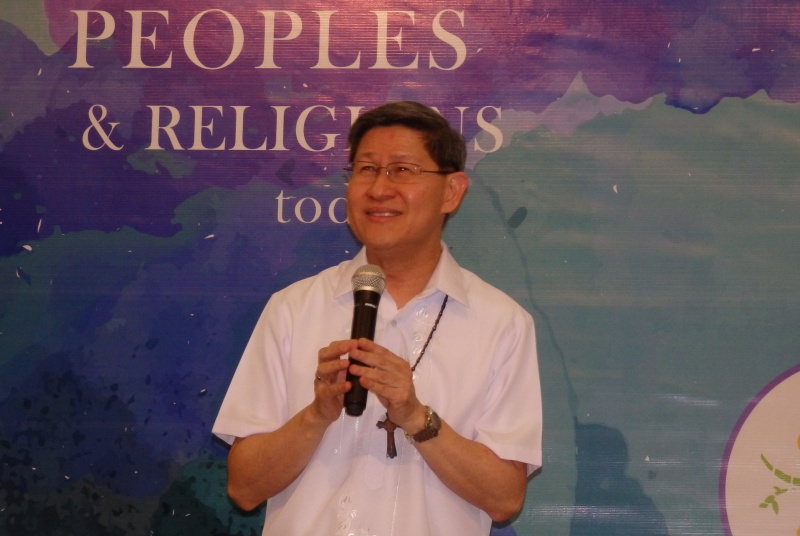
Mar 15, 2017 | Non categorizzato
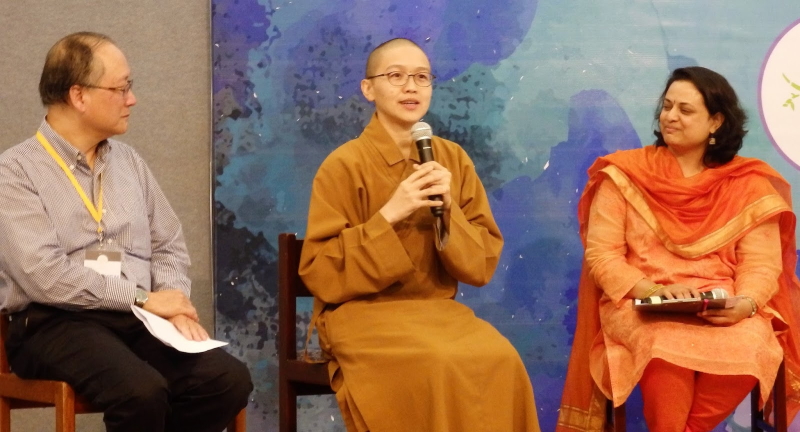 Lake Taal offers an incredibly beautiful panorama, and this year it seemed more so than usual. The temperature at the beginning of March was still perfect, and in the evenings a fresh breeze continued through the night until the mist rolled in around the time the sun rose. Every two years in this part of the Philippines (Tagaytay is a bit more than 40 km from Manila), there has been a course on interfaith dialogue, and this year the chosen title was “Harmony between peoples and religions today.” The School for Oriental Religions (SOR) was founded in 1982 by Chiara Lubich during her trip to Asia. Today the Mariapolis Pace in Tagaytay hosts a training center and various courses for young people, families, priests and seminarians. In addition to SOR, there are two social aid centers. Two hundred participants gathered at Tagaytay from March 2–5, from Pakistan, India, Myanmar, Thailand, Vietnam, China, Taiwan, Indonesia, Malaysia, Singapore, Korea, Japan and of course the Philippines. There were also some Europeans and South Americans. All saw the need for training in order to face the universal challenges that diversity brings. The course is planned to be repeated in participants’ respective countries.
Lake Taal offers an incredibly beautiful panorama, and this year it seemed more so than usual. The temperature at the beginning of March was still perfect, and in the evenings a fresh breeze continued through the night until the mist rolled in around the time the sun rose. Every two years in this part of the Philippines (Tagaytay is a bit more than 40 km from Manila), there has been a course on interfaith dialogue, and this year the chosen title was “Harmony between peoples and religions today.” The School for Oriental Religions (SOR) was founded in 1982 by Chiara Lubich during her trip to Asia. Today the Mariapolis Pace in Tagaytay hosts a training center and various courses for young people, families, priests and seminarians. In addition to SOR, there are two social aid centers. Two hundred participants gathered at Tagaytay from March 2–5, from Pakistan, India, Myanmar, Thailand, Vietnam, China, Taiwan, Indonesia, Malaysia, Singapore, Korea, Japan and of course the Philippines. There were also some Europeans and South Americans. All saw the need for training in order to face the universal challenges that diversity brings. The course is planned to be repeated in participants’ respective countries.  Cardinal Louis Antonio Tagle, archbishop of Manila and president of Caritas International, addressed the group. The Filipino cardinal opened the school by proposing the theme of harmony. Harmony: a typical Asian value. In order to achieve it, one needs to keep in mind that everything changes, and that as one moves forward, the more this change comes rapidly. “The only thing that doesn’t change is change itself,” Tagle affirmed. What is required, therefore, is to stay open and not have any fear of the unknown. In addition, one needs to know how to mediate the differences, accept opposing positions and the possibility of conflict, and to come through it greatly enriched by the differences. Tagle appealed to Catholics to play a lead role with active nonviolence. This is not about being weak, rather demonstrating that working for harmony requires people who have a prepared mind and heart for dialogue and diversity. The four days saw presentations of the successful dialogue between Christianity and the great Eastern religions in India, Thailand, Korea and Japan. Hindu-Christian dialogue was presented through life experiences, social collaboration, and shared projects between the Focolare and Gandhian movements in the south of India, including philosophical and theological reflections. Classic Hindu song was demonstrated and explained. All this occurred in an atmosphere of vital, spiritual clarity. Commonalities have surfaced after many years of dialogue, as well as differences, but these have not lessened the drive to take on dialogue’s challenges. This experience contributed to fulfilling the message of the Second Vatican Council: to build deep relationships with those of other faiths. A new way has begun that can contribute to social, political and global harmony. It is not an end in itself, but a step toward true fraternity.
Cardinal Louis Antonio Tagle, archbishop of Manila and president of Caritas International, addressed the group. The Filipino cardinal opened the school by proposing the theme of harmony. Harmony: a typical Asian value. In order to achieve it, one needs to keep in mind that everything changes, and that as one moves forward, the more this change comes rapidly. “The only thing that doesn’t change is change itself,” Tagle affirmed. What is required, therefore, is to stay open and not have any fear of the unknown. In addition, one needs to know how to mediate the differences, accept opposing positions and the possibility of conflict, and to come through it greatly enriched by the differences. Tagle appealed to Catholics to play a lead role with active nonviolence. This is not about being weak, rather demonstrating that working for harmony requires people who have a prepared mind and heart for dialogue and diversity. The four days saw presentations of the successful dialogue between Christianity and the great Eastern religions in India, Thailand, Korea and Japan. Hindu-Christian dialogue was presented through life experiences, social collaboration, and shared projects between the Focolare and Gandhian movements in the south of India, including philosophical and theological reflections. Classic Hindu song was demonstrated and explained. All this occurred in an atmosphere of vital, spiritual clarity. Commonalities have surfaced after many years of dialogue, as well as differences, but these have not lessened the drive to take on dialogue’s challenges. This experience contributed to fulfilling the message of the Second Vatican Council: to build deep relationships with those of other faiths. A new way has begun that can contribute to social, political and global harmony. It is not an end in itself, but a step toward true fraternity.

 The founder of the Focolare Movement died at Rocca di Papa on the 14th March 2008 at the age of 88 after a long illness. In the telegram of condolence sent by Pope Benedict XVI, he mentioned “her constant commitment for communion in the Church for ecumenical dialogue and brotherhood among all peoples”. He also thanked the Lord “for the witness of a life spent hearing the needs of people today” and expressed the wish “that all those who knew her and follow in her footsteps should keep the flame of the charism alive”. Chiara Lubich’s charism focuses on unity in the human family. It would be a dream if it were not founded on firm faith in the love of God the Father for his children, and on the words of Jesus, “May they all be one”. This charism has much to say to the world today as Maria Voce said to Adriana Masotti. A. – Yes, indeed. It almost has more to say today than when Chiara first proclaimed it. At the time, there was of course the tragedy of war and many painful situations, but there was not the disunity that seems to be spreading so much in the world today. This disunity cries out for the lifestyle brought by the charism of unity God gave to Chiara. We are discovering its relevance more and more. Q. – One of the definitions made of Chiara Lubich was a “woman of dialogue” and dialogue is a subject talked much about in many places today. However, often it does not happen or people do not know how to do it. What did dialogue mean to Chiara and how does the Focolare Movement practice this dialogue? A. – Dialogue was a lifestyle for Chiara, which meant considering every person she met as a brother or sister. Chiara did not want to dialogue; she wanted to love people who were her brothers and sisters; and that is why she was so happy to meet people. She shared what was in her soul and then these brothers and sisters spontaneously responded with the same openness. That is how dialogue began. It is the same for us today; we try to have this attitude towards whomever we meet. We try to do as Chiara did, to be always open, without looking at differences and distinctiveness of any kind except as a way to create an enriching encounter, because it is a meeting with a brother or sister who has something to give us, whatever their ethnicity or religious faith, whatever their social background or age. Q. – So the Movement is convinced that dialogue is the best tool to resolve the many conflicts in the world today. A. – Of course! There is no other way. Why? Because dialogue is love, and if dialogue is love it can truly change the state of the world. It can bring peace to places at war. D. – At the beginning of her spiritual experience, Chiara was strongly aware of humanity’s cry of suffering and she decided to take on and bear this suffering herself. What does the Movement Chiara founded do with regard to the many divisions the world is experiencing at present? R. – The Movement wants to have the same faith as Chiara, a faith based on the cry of Jesus forsaken. Chiara certainly understood that cry as the moment when the Son of God suffered the most, but it was also when He loved us the most. Precisely because he loved us the most, in that moment he re-established the unity that was broken between God and humankind and among people. Therefore, there is no other way of reaching unity than by passing through suffering. However, this suffering is filled with love because it is part of giving one’s life for others. So, considering all the sufferings of the world today, whether at a personal level or at the level of society, peoples or nations, the Movement tries to recognize His countenance in these, to see in them a God who died. But He is also a God who rose again and who can therefore rise above all these sufferings. D. – This translates into many practical activities … R. – Precisely. Perhaps they start with a simple act of love by a family who saw that another family was experiencing a similar difficult situation, and who took upon themselves the difficulties of another family with a disabled child. This created a network of solidarity among many families and involved the local town council. They realized that by loving the countenance of Jesus forsaken in that suffering, something changed. This is what we see. Wherever we are, in places where there is war, our people try to love enemies as well as friends. Goods are shared among all the families without looking to see which ethnic group or religion they belong to… We see this continually in many relationships that change and we see new communities building up that are connected among themselves and spreading more and more. Source: Vatican Radio
The founder of the Focolare Movement died at Rocca di Papa on the 14th March 2008 at the age of 88 after a long illness. In the telegram of condolence sent by Pope Benedict XVI, he mentioned “her constant commitment for communion in the Church for ecumenical dialogue and brotherhood among all peoples”. He also thanked the Lord “for the witness of a life spent hearing the needs of people today” and expressed the wish “that all those who knew her and follow in her footsteps should keep the flame of the charism alive”. Chiara Lubich’s charism focuses on unity in the human family. It would be a dream if it were not founded on firm faith in the love of God the Father for his children, and on the words of Jesus, “May they all be one”. This charism has much to say to the world today as Maria Voce said to Adriana Masotti. A. – Yes, indeed. It almost has more to say today than when Chiara first proclaimed it. At the time, there was of course the tragedy of war and many painful situations, but there was not the disunity that seems to be spreading so much in the world today. This disunity cries out for the lifestyle brought by the charism of unity God gave to Chiara. We are discovering its relevance more and more. Q. – One of the definitions made of Chiara Lubich was a “woman of dialogue” and dialogue is a subject talked much about in many places today. However, often it does not happen or people do not know how to do it. What did dialogue mean to Chiara and how does the Focolare Movement practice this dialogue? A. – Dialogue was a lifestyle for Chiara, which meant considering every person she met as a brother or sister. Chiara did not want to dialogue; she wanted to love people who were her brothers and sisters; and that is why she was so happy to meet people. She shared what was in her soul and then these brothers and sisters spontaneously responded with the same openness. That is how dialogue began. It is the same for us today; we try to have this attitude towards whomever we meet. We try to do as Chiara did, to be always open, without looking at differences and distinctiveness of any kind except as a way to create an enriching encounter, because it is a meeting with a brother or sister who has something to give us, whatever their ethnicity or religious faith, whatever their social background or age. Q. – So the Movement is convinced that dialogue is the best tool to resolve the many conflicts in the world today. A. – Of course! There is no other way. Why? Because dialogue is love, and if dialogue is love it can truly change the state of the world. It can bring peace to places at war. D. – At the beginning of her spiritual experience, Chiara was strongly aware of humanity’s cry of suffering and she decided to take on and bear this suffering herself. What does the Movement Chiara founded do with regard to the many divisions the world is experiencing at present? R. – The Movement wants to have the same faith as Chiara, a faith based on the cry of Jesus forsaken. Chiara certainly understood that cry as the moment when the Son of God suffered the most, but it was also when He loved us the most. Precisely because he loved us the most, in that moment he re-established the unity that was broken between God and humankind and among people. Therefore, there is no other way of reaching unity than by passing through suffering. However, this suffering is filled with love because it is part of giving one’s life for others. So, considering all the sufferings of the world today, whether at a personal level or at the level of society, peoples or nations, the Movement tries to recognize His countenance in these, to see in them a God who died. But He is also a God who rose again and who can therefore rise above all these sufferings. D. – This translates into many practical activities … R. – Precisely. Perhaps they start with a simple act of love by a family who saw that another family was experiencing a similar difficult situation, and who took upon themselves the difficulties of another family with a disabled child. This created a network of solidarity among many families and involved the local town council. They realized that by loving the countenance of Jesus forsaken in that suffering, something changed. This is what we see. Wherever we are, in places where there is war, our people try to love enemies as well as friends. Goods are shared among all the families without looking to see which ethnic group or religion they belong to… We see this continually in many relationships that change and we see new communities building up that are connected among themselves and spreading more and more. Source: Vatican Radio

 As a child, he dreamt of being a pilot, but an attraction to the priesthood stuck with him from the time he was eleven. He was born on May 17, 1932 in Lisnice, the Province of Pisek in Southern Bohemia. From 1952 to 1953 he was a worker. In 1960, following his graduation, he worked as an archivist but soon abandoned that occupation to study theology. In 1968 he was ordained to the priesthood. During a visit to East Germany in the 1960s, he met a layman and some priests who were living the
As a child, he dreamt of being a pilot, but an attraction to the priesthood stuck with him from the time he was eleven. He was born on May 17, 1932 in Lisnice, the Province of Pisek in Southern Bohemia. From 1952 to 1953 he was a worker. In 1960, following his graduation, he worked as an archivist but soon abandoned that occupation to study theology. In 1968 he was ordained to the priesthood. During a visit to East Germany in the 1960s, he met a layman and some priests who were living the 













